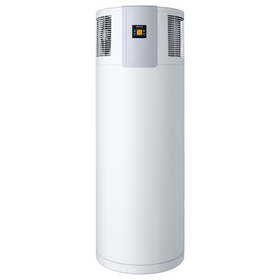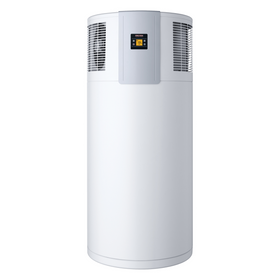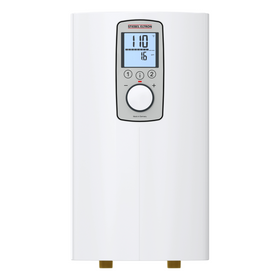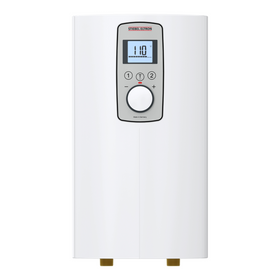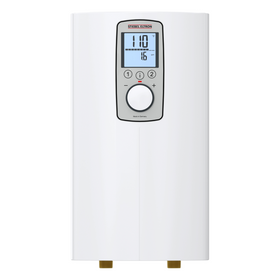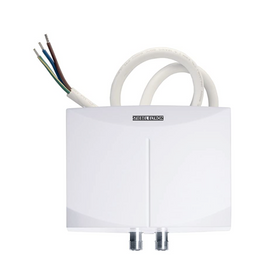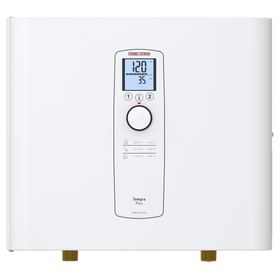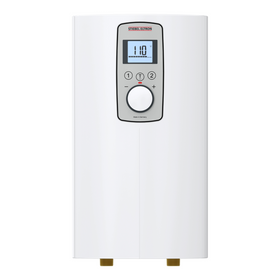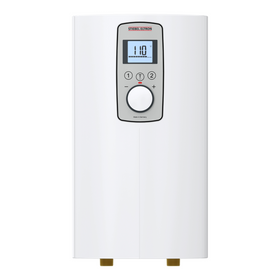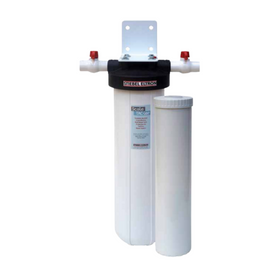
Heat Pump Water Heaters
Last Updated: Feb 8, 2025For most of us, starting our day with a long, steamy hot shower is probably a part of our routine. As the day progresses, we rely on hot water to wash our dishes, clothes, and every time we turn on a faucet in our home. We often take the hot water running through our faucets for granted. But, we frequently don't think about the enormous amount of energy it requires—and associated environmental cost —to take those hot showers.
Table of Contents
- How Much Energy Do We Use For Hot Water?
- How Can You Save Money on Water Heating?
- What Water Heating Methods Are More Efficient Than Conventional Hot Water Tanks?
- What is a Heat Pump Hot Water Heater?
- How Does a Heat Pump Water Heater Work?
- What Are The Pros of a Heat Pump Water Heater?
- Considerations When Purchasing and Installing a Heat Pump Water Heater
- How To Install a Heat Pump Water Heater
- How Much Is a Heat Pump Water Heater?
- Best Heat Pump Water Heaters on the Market Today
- Bottom Line

How Much Energy Do We Use For Hot Water?
The US Department of Energy estimates that about 17 percent of all residential household energy usage stems from hot water in a home. For most homeowners, that adds up to more energy than all other household appliances combined (not including space heating, air conditioning, and ventilation).
How Can You Save Money on Water Heating?
Behavioral changes and retrofits can reduce the energy needed for hot water in your home. These changes could include:
- Taking shorter showers
- Using cold water for washing clothes
- Avoiding using hot water when you wash your hands
- Installing low-flow showerheads and faucet aerators
However, changing how you heat water in your home is a much more practical and effective strategy.

What Water Heating Methods Are More Efficient Than Conventional Hot Water Tanks?
Tankless or on-demand water heaters can dramatically cut back on your energy bill. These systems don't need to heat large volumes of water continually. But many of these tankless heaters are still gas-powered, are costly to purchase and install.
On the other hand, heat pump water heaters can be part of a broader strategy for homes looking to gain net-zero status - and take home sustainability to a whole new level.
What is a Heat Pump Hot Water Heater?
A heat pump water heater is essentially a refrigerator working in reverse. Refrigerators use electricity to remove heat from a small enclosed area where you store your food. A heat pump water heater captures the heat from the surrounding air and transfers it into a water tank to heat water.
In general, it is almost always more energy-efficient to move something than to create something. In the case of heat, creating heat takes an enormous amount of energy. For this reason, heat-generating devices such as furnaces, water heaters, and clothes dryers are some of the most energy-intensive appliances and devices in a home.
How Does a Heat Pump Water Heater Work?
Heat pump water heaters focus on moving the heat that is already present in the air, either from inside or around your home. They then store that heat in the form of hot water to be used for your household needs.
Even during the coldest months of the year, there is always heat energy in the air, water, and underground. Heat pumps have garnered the most attention for their ability to offer a more sustainable and energy-efficient solution towards home heating. Using heat pumps as a hot water solution could be another useful step along your journey to a sustainable home.
What Are The Pros of a Heat Pump Water Heater?
The most evident sustainability feature of heat pump water heaters is that they can reduce your household energy needs because it requires less energy to move heat than to create it. Heat pump water heaters tend to expel cool air and thus cool the area around them. So, they can be used to reduce your air conditioning needs during the summertime. Still, that same feature isn't beneficial during the winter.
In addition, heat pump water heaters can be combined with air-to-air heat pumps. This will provide a system that can heat and cool your home and provide hot water to your home. These heat pumps can be powered by residential rooftop solar panels, potentially giving your home a carbon-neutral source of heating, cooling, and hot water.
Simultaneously, heat pump water heaters can save you a significant amount of money on your utility bills. According to ENERGY STAR, homes that switch from a traditional electric water heater to a heat pump water heater could save up to $330 per year for a four-person household for a total of two years of payback time. Over the lifetime of the unit, homeowners can expect a total savings of almost $3,500. Heat pump water heaters have a typical lifespan of 13 to 15 years, which is considerably higher than conventional electric or natural gas water heaters. This durability makes them a better long-term investment for your hot water needs
Considerations When Purchasing and Installing a Heat Pump Water Heater
Heat pump water heaters require certain conditions to work effectively. First, a stand-alone heat pump water heater can only be installed in locations where the average temperature oscillates between 40 and 90 degrees Fahrenheit. So, for instance, don't install in a garage that freezes in winter and is very hot in summer. Even in cold climates, heat pump water heaters are effective. You should install them in areas that you don't keep warm, like the basement, near your furnace.

How To Install a Heat Pump Water Heater
It is important to note that heat pump water heaters require professional installation; they require fans to intake and outflow of air and a piping system to drain the condensate flow outside your home. When installing, you need to ensure that you install the heat pump water heater to have at least 1,000 cubic feet of surrounding air for proper functioning.
If you live in a region with cold winters with temperatures routinely below zero, you can opt for a hybrid heat pump water heater. These hybrid options include a standard electric resistance heating option that will automatically activate when the heat pump cannot capture and move enough hot air from the surrounding area to heat water to a set temperature.
Hybrid options often have several operating modes, including:
- an efficiency mode that only utilizes the heat pump for heating water
- a hybrid mode that mixes the heat mode and the electric element for daily hot water use
- a purely electric mode that allows you to never go without hot water in your home, even when winter temperatures grow extremely cold
How Much Is a Heat Pump Water Heater?
Heat pump water heaters range in price from around $1,000 to $2,500. Installation costs vary, but you can expect to pay between $350 and $650, in addition to the purchase price.

Best Heat Pump Water Heaters on the Market Today
Many companies sell heat pump water heaters. Below, we look at three top products based on their energy efficiency rating, their warrantees, and their ability to be programmed with smart home technology.
Rheem Prestige Series Hybrid Heat Pump Water Heater
This hybrid heat pump water heater is unique in that it can be connected to your household Wi-Fi system and controlled and operated with a mobile app. It is one of the most energy-efficient options on the market, as it has an energy factor of 3.55. For most households, this device will require 1,255-kilowatt-hours (kWh) per year. Traditional water heaters can use upwards of 4,500 kWh per year, thus decreasing that portion of your electric bill by over 70 percent.
AO Smith Voltex Residential Hybrid Electric Heat Pump Water Heater
This model is another high-quality heat pump water heater that can save you up to $387 per year. It has an energy factor of 3.24 and comes with an easy-to-use LCD. It offers a 6-year warranty and allows you to program the heater for vacation modes when you are away from home.
GE GeoSpring Heat Pump Water Heater
The GE GeoSpring Heat Pump Water Heater is another alternative that offers significant savings. This product can be controlled remotely by separately purchasing the GE Wi-Fi Connect System. It uses around 1,407 kWh per year to operate, thus potentially saving you thousands of dollars over the unit's lifetime.
Bottom Line
If you need a new water heater for new construction, renovation, or replacement, a heat pump water heater is an excellent choice. It will help you reduce your reliance on fossil fuels and save money on your energy bill.
Tobias Roberts
Tobias runs an agroecology farm and a natural building collective in the mountains of El Salvador. He specializes in earthen construction methods and uses permaculture design methods to integrate structures into the sustainability of the landscape.

